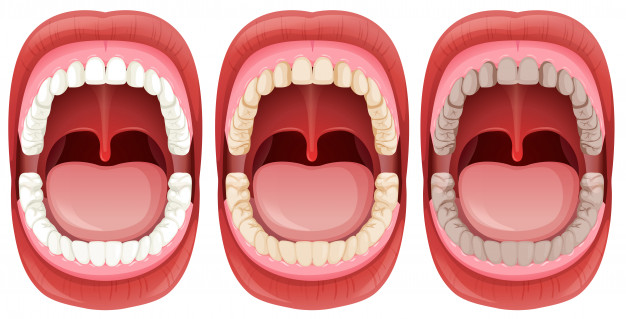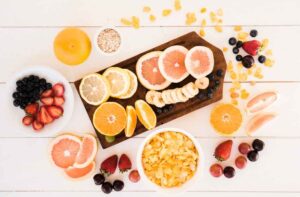Common Food And Drinks that can Affect Your Healthy Teeth
5 min read
Our teeth and gums do way more than just eating. They are the first machinery in the digestion process, necessary for efficient chewing, grinding, and swallowing. We become what we eat, they say, and hence, the first effects of our eating habits can always be seen in our oral health.
Many foods and drinks create plaque, which is harmful to our teeth. Plaque is a greasy, bacteria-filled layer that causes tooth decay and gum diseases.
Bacterial plaque feeds mostly on the sugar in our diet. Cavities form because of germs digesting sugar and reducing it to acid, which dissolves our enamel and tooth structure. Enamel erosion often leads to cavities.
In this blog, we talk about common foods and drinks that adversely affect our healthy teeth.
- Sugar Candies and Desserts
Whenever we talk about food items that hurt our teeth, candies, and sweets always top the list. And they surely are irresistible, but you should choose to have sweets that dissolve rapidly in your mouth.
Crackers, popsicles, gummy candies, and jelly beans, for example, have the toughest sugars to be washed away by the saliva. Many high-sugar desserts that promote tooth decay and are the most popular, include processed chocolate cookies, cakes, and pies.
If you still can’t stop yourself from having desserts, try to have them after a full meal. Also, if at all possible, wash your mouth after eating anything sugary.
- Drinking Carbonated Drinks
Soda and pop have almost zero nutritional value regardless of what the ads say. In fact, some studies even conclude that sipping large volumes of fizzy soda may be as bad for your teeth as consuming crystal meth. Carbonated beverages encourage plaque to generate more acid, which attacks the enamel. So, if you drink pop a lot, you’re covering your teeth in acid. It dries up your mouth, resulting in Xerostomia. Finally, murky sodas might darken or stain your teeth. A word of caution: do not use brush or floss shortly after drinking any carbonated drink; doing so may speed up deterioration.
- Sipping Caffeinated Beverages
Tea and coffee, when consumed in their unaltered form, can be healthful beverage options. However, far too many people cannot help and add sugar to the taste. Most often, caffeinated drink dries out the mouth and causes bad breath, and if consumed frequently, it can also discolor the teeth. If you want to have coffee or tea regularly, make sure to rinse your mouth and drink a sufficient amount of water throughout the day.
- Consuming Citrus Fruits
Citrus fruits are an essential part of a healthy diet. However, if you consume them in large amounts, the citric acid released from the fruits can erode the tooth enamel, making your teeth prone to cavities. Oranges, limes, and grapefruit, in particular, are quite acidic. While drinking fruit juice, use a straw to allow the least amount of acids to flow through your teeth. Furthermore, citric acid might irritate mouth ulcers.
- Eating or Drinking Sugar
Sugar is sugar, be it brown sugar, processed white sugar, or even honey. What matters most is not how much you consume, rather how frequently you consume it. Sugar creates an acidic condition for your teeth that lasts for several hours of consuming it. Clearly, drinking or eating sugar frequently means soaking your teeth in acid and damaging the tooth enamel.
Sugar is also abundant in processed items such as sauces, syrups, and ketchup. Juices advertised as “no added sugar” often contain a considerable amount of natural sugar.
- Sticky Dried Fruits
We often consider dried fruits a healthy snack. That is true, however, many dried fruits, such as apricots, grapes, dates, and raisins, are sticky. They get trapped and adhere to the teeth and gaps, releasing a lot of sugar. If you enjoy eating dried fruits, always clean your mouth with water first, followed by brushing and flossing. And even though they are lower in sugar concentration, eating fresh fruits is a better choice. Also, you should limit the frequent consumption of dried fruits as it leads to tooth decay.
- Apple Cider Vinegar
Although apple cider vinegar is valued for its purifying benefits, it is quite acidic and can easily damage your dental enamel. If you consume apple cider vinegar, try to drink it in one go, keeping minimal contact with teeth. After that, you should cleanse your mouth and teeth.
- Crackers and Chips
Crackers contain processed carbs, and multiple studies have confirmed the association between excessive processed carb consumption and increased systemic inflammation. Inflammation is a key factor in many chronic illnesses, including inflammation in the teeth, gums, and surrounding tissues.
For so many of us, crunching potato chips is ceaselessly satisfying. However, they are high in starch, which converts to sugar and gets caught in between teeth, feeding the germs in the plaque. Since we eat an excessive number of chips, the acid produced by them persists for a long time. Flossing is the best thing you can do after devouring that big bag of chips.
- Drinking Wine
Erosive acids, found in wines, weaken the enamel. Red wine has tannin, which dries out the mouth and discolors the teeth. If you wish to consume wine, make sure to brush your teeth first. Brushing your teeth before drinking wine or alcohol reduces the amount of plaque that wine can adhere to. You should wait for at least thirty minutes after drinking an acidic drink.
To summarize, sugars and acidic products can be your teeth’ greatest enemy. Consuming foods that supply essential nutrients, reduce acids, promote salivation, or restore dental enamel will make your mouth happy. A good diet can aid in the development of healthy teeth and gums. Avoid processed foods that create plaque buildup on your teeth. Rather, nibble on less corrosive foods such as nuts, non-acidic fruits, and veggies.
POM Dental Studio helps you to have the best possible dental health. Peace of Mind Dental Studio takes great satisfaction in providing their patients calming and restorative dentistry experience for their mouth, body, & mind. Call us today at 480–608–5444 if you have any queries about dental hygiene or you wish to make an appointment.





